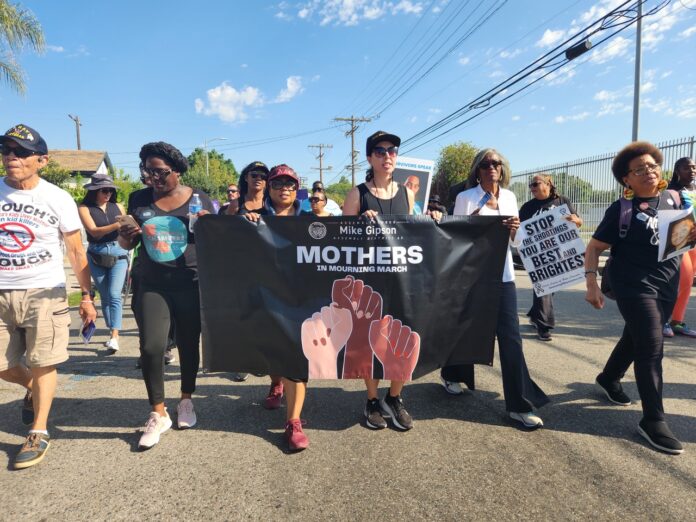
By Aldon Thomas Stiles, Califoria Black Media
On Sept. 9, elected officials, community leaders and concerned citizens took to the streets of Watts in South Los Angeles to march against gun violence in California.
Dubbed the “Mothers in Mourning March,” the women-led event was organized by Assemblymember Mike Gipson (D-Carson) featured guest speakers and over 34 participating organizations.
Participants marched from Jordan High School to Edwin Markham Middle School and walked back to Jordan in temperatures that hovered up to the high 80s, shouting impassioned chants like “put those guns down,” “stop the killing,” and “start the healing.”
“We are proud to be here at Jordan, and from the housing complexes to the highways we are making our voices known: Let our babies live,” Gipson posted on X, formerly known as Twitter.
At a post-march rally, speakers shared personal accounts, some tearful, about their experiences with gun violence.
“For our children we lost, we are their voices, and their voices will continue to be heard here and everywhere around this nation,” Mattie Scott, the California chapter leader of the advocacy organization Mothers in Charge, said. “We will stop the killing and start the healing because this is for all of us or none of us.”
Scott reminded voters that they have power to push anti-Gun policies against the forces across the country that fiercely oppose them — from “our house, to the courthouse, to your house, to the White House.”
As of last year, firearms are the leading cause of death among children in the United States.
While the Center for Disease Control (CDC) reports that California has the 8th lowest death rate by guns and Los Angeles has seen a decrease between 2021 and 2022, Los Angeles County accounts for a majority of California’s gun related deaths, according to Hope and Heal Fund.
African Americans between the ages of 15 and 34 experience gun-related deaths more than any other group in the United States, according to the Center for American Progress.
Overall, Everytown Research & Policy reports, that Black Americans “experience 12 times the gun homicides, 18 times the gun assault injuries, and nearly 3 times the fatal police shootings” as compared to White Americans.
Karren Lane, the Deputy Mayor of Los Angeles, stressed the importance of all Californians getting involved in the legislative process to help stem gun violence.
“Our commitment is to prevent that violence,” she said. “We cannot do that as a city without the organized political power of everyday people.”
She went on to speak about how the march might have an impact on those who have a vested interest in the prevention of gun violence.
“This event is so significant because one mother suffering alone feels isolated and silenced,” she said. “But when we come together and organize our voices, we are political power. We are organized power.”
Speakers also focused on explaining anti-gun violence bills that Gov. Newsom has signed and others the Legislature has approved.
Assembly Bill (AB) 28, for example, which has been approved by the Legislature, would impose an 11% tax for sales for firearms and firearm related items like ammunition and other “precursor parts.”
Gov. Newsom signed AB 1621, authored by Gipson, last year. It bans ghost guns, which are “unserialized and untraceable firearm” parts that can be assembled without any form of regulation or oversight.
LA Unified School District board member Tanya Ortiz Franklin, one of the speakers, encouraged Californians to vote to protect their children.
“We have the power to change the world with the kids in our district. We have future presidents, we have future engineers, we have future public safety officers, we have future changemakers right here in our district. But they need to have a future and they have to live into their potential and it’s going to take all of us demanding that,” she said.
Franklin’s voice echoed that of many of the women and allies attending the march who chanted at intervals, “No more silence, end gun violence!”



